Feb 2012
Feb 2012 sadminA professional boost for health
A professional boost for health sadminEmployment news
A professional boost for health
The KwaZulu-Natal Department of Health welcomed community service officers and interns placed to serve the province in 2012.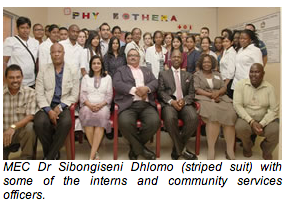
“We congratulate all the healthcare professionals who have joined us as community service officers and interns to complete their training and to make themselves, their parents and their country proud,” said Health MEC Sibongiseni Dhlomo.
This year the Department has employed 425 community service officers spread across the province to serve our people in multiple disciplines in the following categories:
- 152 medical officers
- 57 radiographers
- 40 physiotherapists
- 37 pharmacists
- 34 environmental health practitioners
- 32 occupational therapists
- 31 dieticians
- 30 audio and speech therapists
- 12 physiotherapists
According to Health Minister, Dr Aaron Motsoaledi, “It is the dawn of a new phase that comes with even greater responsibilities, that requires accountability, strategic leadership and adherence to the pledge that you made to keep up ethics of the health professions.”
“We are appealing to you to work with us to give our people the respect and dignity they deserve. Always remember that health is a human right”. With that in mind, we also announce a ground breaking undertaking that will begin to enhance the number of doctors produced for our country,” Motsoaledi said.
“We are … very elated about this undertaking considering that the University of KwaZulu-Natal does not admit more than 200 first year students intending to study Medicine. This also applies to the eighth medical schools spread across South Africa, that combined their intake does not exceed 2 000 first year students. … This opportunity will ensure that those students who did not get spaces in South African universities realise their dreams and come back to serve the people of this province known to be the epicentre for HIV and TB, as well as maternal and child morbidity and mortality, chronic diseases of lifestyle and trauma and violence.”
Agri graduates call for more internships
Agri graduates call for more internships sadminEmployment news
Agri graduates call for more internships
Graduates from Potchefstroom College of Agriculture in North West called for government to increase the number of internships for agriculture students. This will help to reduce unemployment among students graduating from 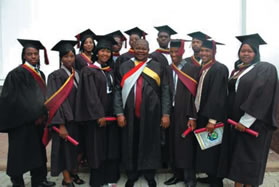 tertiary institutions.
tertiary institutions.
“Agricultural skills are scarce and the sector needs skilled people. As a qualified grain grader, the government needs to consider us for vacancies in closing the gap and address the shortage of skills in the sector,” said graduate Morake Gomolemo.
Tshegofatso Seimelo, who also graduated recently, said government could reduce the unemployment rate by considering diplomas as requirements for applicants rather than considering only degrees for agricultural vacancies.
North West College of Agriculture principal Dipepeneneng Serage said the theoretical training and practice of agriculture acquired by the diploma graduates for the past three years, qualified them to perform any agricultural activities in mixed farming.
All-women co-op bags additional opportunities
All-women co-op bags additional opportunities sadminEmployment news
All-women co-op bags additional opportunities
The demand for eco-friendly shopping bags has opened additional business opportunities for an all-women Eastern Cape cooperative.
From its humble beginnings in 2004, the Greater Uitenhage Sewing Cooperative (Gusco) has grown its business over the years as their multi-coloured eco-friendly shopping bags are proving popular with environmentally conscious shoppers.
One of the remarkable success stories of Gusco is a contract to supply their multi-coloured eco-friendly shopping bags to the upmarket retail chain, Woolworths. They supply more than 300 000 eco-friendly shopping bags for Woolworths worth more than R3, 5 million. They have also identified new markets in the retail sector.
Additional contracts
Nafeesa Dinie, Business Unit Head of Uitenhage Despatch Development Initiative (UDDI), said they hoped to grow Gusco’s business this year by attracting and securing additional contracts and are looking at opportunities to create a more diverse range of products.
UDDI helped with the establishment of Gusco when three different sewing cooperatives were merged in a bid to create employment and business opportunities for the women.
Strong partnerships
“Initial discussions have been held with Woolworths regarding future potential growth opportunities. With forging strong partnerships … a solid business foundation has been established and has resulted in a successfully and commercially viable cooperative contributing to the local economy and job creation,” said Dinie.
“The ladies of Gusco have come a long way from being unemployed to being business owners and this has been achieved in a relatively short period with the support of all stakeholders. Woolworths was key to this success, and this clearly signals the company’s commitment to support and contribute to sustainable community enterprise development in our country.”
Gusco was established in partnership with Standard Bank South Africa, Volkswagen South Africa Community Trust and UDDI as the project managers. An industrial production facility was established with start-up funding from the partners. Cooperative members attended various skills and business management development training programmes.
A technical expert was appointed to oversee the operational and production management.
Women empowerment
The production is in accordance with quality production standards, and currently empowers 27 women as members of the cooperative.
The expansion of the garment manufacturing facility will provide opportunities for other groups to be trained and for a variety of additional products to be developed.
This will link it to other market opportunities and will contribute to socio-economic development and sustainable job creation.
-Mbulelo Baloyi
Crafting an income brings hope and dignity
Crafting an income brings hope and dignity sadminEmployment news
Crafting an income brings hope and dignity
Delegates at the recent COP 17 Climate Change conference were in awe of the beautiful craftwork in the form of crochet, fabric painting, beading and wire art displayed at the Department of Arts and Culture's stand in the exhibition hall.
The craftwork, which received the Best Green Exhibition Award at the conference, was the work of people from the Woza Moya project at the Hillcrest AIDS Centre Trust west of Durban. 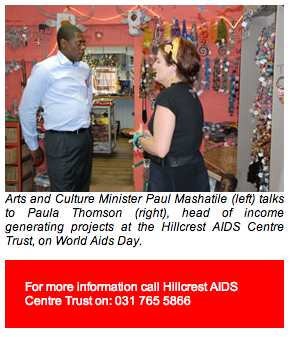
Woza Moya is an income generation project of the trust. It helps those in need regain hope and dignity by getting them to use their creativity to earn an income.
Economic empowerment
Woza Moya acts as an agent for over 200 crafters. As the AIDS epidemic increases, more families are turning to the project for help
Woza Moya assists by offering them training in different crafts. It markets the goods and there is a small shop on the centre’s premises that belongs to the crafters.
The project has proven that with the right care and access to medication lives can be turned around. The centre has found that economic empowerment is one of the most important factors in fighting this epidemic, because as it gives the crafters the hope of looking towards the future.
The use of arts and crafts to the benefit of patients, as well as the project’s success, caught the attention of the Minister of Arts and Culture Paul Mashatile who commended the centre for using the crafts project for economic development.
Job creation
Minister Mashatile said the trust’s art project is in line with the objectives of the Department of Arts and Culture’s strategic focus of repositioning the role of arts, culture and heritage in economic development, job creation and social cohesion.
“This centre is an exciting example of how the arts can be used to great benefit. At this centre, having skills like sewing, fabric painting, beading – all mean an income, an opportunity for creative output, a chance at a better life,” the Minister remarked.
He added that art could contribute to job creation, skills development and benefit those in need. Crafters use their skills to feed, clothe and care for their families, many of whom are either infected or affected by HIV and AIDS.
The centre self-generated an income of R4 million in 2010.
-Mbulelo Baloyi
DAC bursaries for heritage related studies: 2012
DAC bursaries for heritage related studies: 2012 sadminEmployment news
DAC bursaries for heritage related studies: 2012
The Department of Arts and Culture invites applications for bursaries from students who wish to pursue studies in heritage related programmes. The bursary will finance certificates, diplomas, and degree courses at accredited further and higher education institutions.
Eligibility
- South African citizenship
- Academic potential / satisfactory academic performance (academic progress report if already at an institution)
- Field of study (heritage related)
- Financial circumstances
- Acceptance letter or proof of registration at an institution of higher learning
Fields of study
- Archaeology
- Anthropology
- Conservation and preservation
- Collections management
- Heritage resources management
- Museum management and curatorship
- Natural and / or cultural history collections
- Courses that contribute to the preservation and promotion of SA Living Heritage
Value of the bursary
- Registration and tuition fees payable directly to the institution of learning
- Accommodation
- Books
Required documents:
The following documents must accompany the application:
- Certified copy of birth certificate or ID document
- Certified copy of the salary statement or affidavit (if not working) of your parents/guardians
- Certified copy of grade 12 certificate or statement of grade 12 results
- If already studying – latest results / academic record
- Acceptance letter or proof of registration at an institution of higher learning
Application forms can be obtained from the offices of the Department of Arts and Culture, 5TH Floor, 481 Kingsley Centre, Cnr. Beatrix & Church streets in Arcadia, Pretoria or online at www.dac.gov.za
Completed application forms together with certified copies of necessary documents should be sent to the:
The Director General
Department of Arts and Culture
Private Bag X897
Pretoria
0001
Or
Applications can also be hand delivered to:
The Director General
481 Kingsley Centre 5th Floor
Cnr. Beatrix & Church Streets
Arcadia
Pretoria
Enquiries regarding the bursary applications should be directed to Mr Mahunele Thotse at: Tel: 012 441 3470.
Please note: No applications by e-mail nor fax will be accepted.
The closing date for submission of applications is Friday 24, February 2012 at 16h30.
No late applications will be considered.
Education: 2011 Matrics raise the bar
Education: 2011 Matrics raise the bar sadmin
Mathematics
During a live television broadcast, Minister Motshekga said she was pleased to announce the national pass rate of 70,2 per cent for 2011, an increase of 2,4 per cent on the 67,8 per cent achieved in 2010.
The percentage of candidates who qualified for university studies increased to 24,3 per cent, up from 20,1 per cent in 2008. A total of 104 033 candidates passed Mathematics, while 96 441 candidates achieved a pass in Physical Science.
The pass rate for Mathematics is 46,3 per cent in 2011, a decline from 47,4 per cent in 2010. In Mathematical Literacy, 236 548 learners passed, compared to 241 576 in 2010.
Minister Motshekga welcomed the improved performance in Physical Science – given the subjects priority status – but expressed concern about candidate performance in Mathematics.
“We have a strategy in place, which we will vigorously implement in 2012 to improve the pass rate and the quality of Mathematics and Physical Science – the National Strategy for Mathematics, Science and Technology Education,” the Minister announced.
“Our focus will be on four areas: improving the participation and performance of girl learners, helping schools to improve learners’ subject choices, ensuring correct placement of teachers, and focusing teacher development efforts on subject and pedagogical content knowledge.”
Highest pass rate
The Western Cape registered the highest pass rate at 82,9 per cent, up from 76,8 per cent in 2009, an improvement of 6,1 per cent. Gauteng achieved 81,1 per cent, up from 78,6 per cent in 2010 and an improvement of 2,5 per cent.
North West achieved 77,8 per cent, up from 75,7 per cent, an improvement of 2,1 per cent. Northern Cape achieved 68,8 per cent, down from 72,3 per cent in 2010, a decline of 3,5 per cent.
Free State achieved 75,7 per cent, up from 70,7 per cent, an improvement of 5,0 per cent. KwaZulu-Natal achieved 68,1 per cent, down from 70,7 per cent in 2010, and a decline of 2,6 per cent. Mpumalanga achieved 64,8 per cent, up from 56,8 per cent representing the largest improvement by a province.
Limpopo achieved 63,9 per cent, up from 57,9 per cent and an improvement of 6,0 per cent. The Eastern Cape achieved 58,1 per cent, down from 58,3 per cent in 2010, and a decline of 0,2 per cent.
The 2011 National Senior Certificate examinations were free of incidents and proceeded without any significant problems.
Action plan to 2014
Minister Motshekga said the department’s work was guided by the long-term strategy for improving quality education, Action Plan to 2014: Towards the Realisation of Schooling 2025. Going forward, performance in the National Senior Certificate examinations and in the Annual National Assessments for Grades 3, 6 and 9 will provide evidence on whether we have achieved targets of our action plan.
While there is still a great deal of work to be done, the department has made great strides in many areas. Examples are growth in Grade R enrolment, which more than doubled between 2003 and 2011. In addition, more young South Africans are accessing basic education and completing Grade 12. And more young people are completing Grade 9, from 80 per cent in 2003 to 88 per cent in 2010.
The workbook programme will be extended from Grades 1 to 6 to Grades 7, 8 and 9 in all schools. This will help improve access to educational material and teacher guidance and promote literacy and numeracy. This expansion will complement the introduction of the new Curriculum and Assessment Policy Statement (CAPS), which will be phased in from this year.
The new CAPS constitute one of the major steps to improve our curriculum. Every subject in each grade now has a single concise CAPS. This provides specific content on what teachers ought to teach and assess grade by grade and subject by subject. This year, the CAPS will be introduced in Grades 1 to 3 and 10. Teachers have been trained and learning support materials developed for successful implementation.
Education: A call to parents to cast their votes
Education: A call to parents to cast their votes sadmin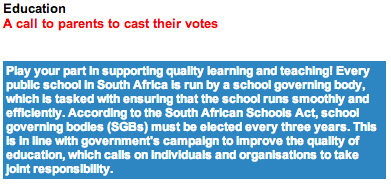
The next elections are scheduled to take place in March this year in all public schools throughout South Africa. The Department of Basic Education has dedicated the entire month of March to the elections.
It is important for all parents to be involved in the running of their children's school and the SGB is the ideal avenue to do so. It enables parents to play an active role in working with government to ensure quality education in their children's schools.
Quality of education
The elections are vital in:
- improving the quality of education
- ensuring good governance
- ensuring that schools serve the interests of the community and meet expectations of parents
- assisting in spreading the cost of education across users and society as a whole, and
- combating racism, sexism and all other forms of unfair discrimination and intolerance.
An SGB is made up of the parents, educators, non-teaching staff, learners (from Grade 8 and higher) and community members. The term of office is one year for learners and no more than three years for all other members.
School principals are automatic members of the SGB. The SGB may co-opt members with expertise in areas that may benefit the SGB and the school. Co-opted members, however, have no voting rights.
Key role
Governing bodies also have a key role to play in making policies relating to issues such as language, religious instruction, school fees and a code of conduct for learners. Such policies must allow all South African children the following:
- to enter the schooling system
- promote values of non-racialism nonsexism
- help communities to respect and tolerate
each other's religions and cultures, and - encourage children to speak some of the
official languages.
Policies must also promote respect for children's rights and non-violent ways of solving problems.
The power to improve education lies with all of us. The Department calls on all department officials, teachers, students, parents and community members to make a commitment to a 'Code for Quality Education'.
The Department of Education has drawn up national guidelines for the election of SGBs, which have been distributed to schools and districts to assist each school to administer fair and democratic elections.
Education: A young man of many distinctions
Education: A young man of many distinctions sadmin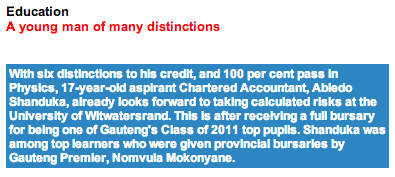
Shanduka, who will be studying towards an Actuarial Science qualification, comes from Meadowlands Secondary School in Soweto, which was marred by disruptions last year. But thanks to his commitment and the intervention from the Gauteng Department of Education, he was able to defy the odds to emerge number one for his school.
Hard work and focus 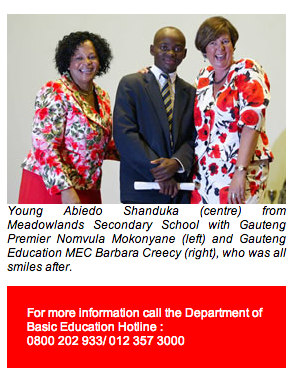
Shanduka attributed his achievements to hard work and focus. "There were lot of disruptions at our school last year but I decided to not let them get in my way. I studied hard and my dedication finally paid off, "he said. The humble teenager also credited the Secondary School Improvement Programme, which was launched by the Department of Education in 2010, for his success.
The programme targets learners from underperforming high schools across the province and provides them with extra tuition support. This intervention has borne fruits as the province achieved 33 989 distinctions, with 6 109 distinctions from township schools.
Support your kids
Shanduka's jubilant father, Lloyd Mamali, said he was overwhelmed with joy over his son's achievements. "I cannot begin to express my pleasure considering the problems that the school encountered last year. I am very happy he did not let obstacles derail him," he said. Mamali encouraged other parents to be supportive of their kids and always be there for them during difficult times.
For his efforts, Shanduka received a laptop, a Blackberry cellphone and a printer, which will be a great help with his studies. Gauteng MEC for Education Barbara Creecy congratulated Shanduka and said the results are a true reflection of the cooperation, support and teamwork among learners, educators, department officials, parents, communities and stakeholders
Education: Extra care and support for Gauteng learners
Education: Extra care and support for Gauteng learners sadmin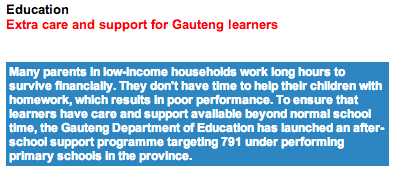
The programme is aimed at providing primary school learners with an extra hour of supervised homework and one hour of supervised play or physical education after school every day.
Homework 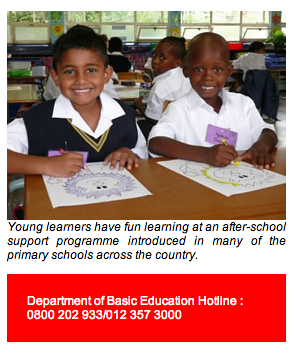
The department has recruited and trained part-time workers to provide homework assistance, as well as sporting activities in partnership with the Extended Public Works Programme of the Department of Infrastructure Development.
The duties of these homework assistants are to ensure that learners do their homework and that they arrive on time. They also facilitate studying, check homework, discuss progress and challenges in completing homework, sign homework books, keep an attendance register and report on successes and challenges.
Participation
The launch of programme comes after the department recognised that parents in low-income households don't have time to help their children to do their homework and that some children are from child-headed households. These learners either have no support with their academic work or do not have space to do their homework because of overcrowded living conditions.
Speaking at the launch of the programme at Nqubela Primary School in Thokoza, Gauteng MEC for Education Ms Barbara Creecy said this initiative would maximise learner participation in other activities by giving them access to arts and culture projects. In addition, the programme will introduce sporting codes that schools were not previously exposed to such as rugby, football, cricket and netball.
All activities will take place after school and end at 16:00 each weekday. Scholar transport and school nutrition will be adjusted to align with the programme
Education: Top achiever against all odds
Education: Top achiever against all odds sadmin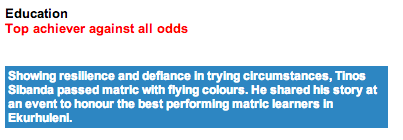
Facing what many would deem insurmountable challenges, the triumphant Tinos Sibanda managed to obtain six distinctions, including in Mathematics and Science, in matric. The 18-year-old matriculant from Balmoral College in Boksburg told his peers how he succeeded against the odds.
Sibanda's father passed away when he was a small boy and his mother went to the UK in 2001 and never returned. He was forced to drop out of school in Grade 10 because of financial difficulties. He later found himself in a bogus school where he passed Grade 11, but it was not recognised by the Department of Basic Education.
He eventually enrolled with Balmoral College, but he still had financial difficulties. "The school saw me through financially and nutritionally. For that I am grateful. It's through this kind gesture that today I stand here with six distinctions," Sibanda told the other learners.
Bursary 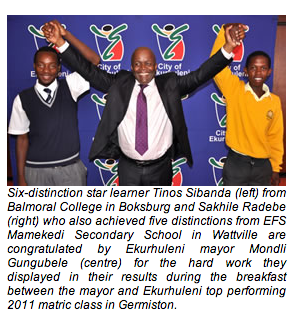
Ekurhuleni Mayor Mondli Gungubele offered Sibanda a full study bursary to pursue a Bachelor of Science at University of the Witwatersrand.
Motivating learners, Gungubele said, "The good thing about education is that you might not remember a paragraph you learned in class, but education stays with you. The essence of being at school stays with you and your life will never be the same again."
The learners were part of the 22 300 Ekurhuleni Grade 12 learners who sat for final examinations. Of these, 18 446 passed, constituting an 82,5 per cent pass rate.
Gungubele announced that the municipality was to put recreational facilities in place and support early childhood development education (ECD) in a bid to reduce the number of learners that disappear from the schooling system without reaching Grade 12.
Mental growth
"In 2000, 923 463 learners started Grade 1 and only 496 090 sat for exams in 2011. To add to this, an astounding 30 per cent of university drop-outs are attributed to failure to comprehend the English language," Gungubele said.
"Recreational facilities and supporting ECD is fundamental to the education and intellectual development of children and we believe that focus on the early development phase will solve the problem."
"The facilities give children more mental growth and development, independent thinking and problem-solving skills, while ECD ensures that issues of numeracy and literacy are grasped at an early level."
Every year, deserving students who would not be in a position to follow their dreams without financial assistance, receive mayoral bursaries.
-BuaNews
Education: Workbooks a valuable learning tool
Education: Workbooks a valuable learning tool sadmin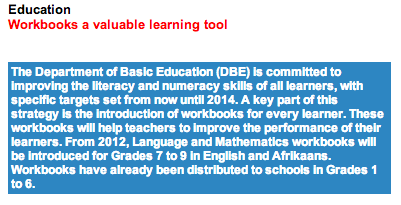
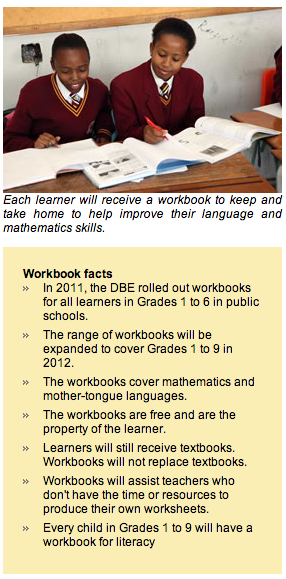
Each workbook is made up of 128 easy-tofollow worksheets for listening, reading and writing skills. The workbooks are organised into four worksheets per week, divided over eight weeks per term. All workbooks comply with the latest Curriculum Assessment Policy Statement of 2011.
Take home
The books provide every learner with easyto- understand worksheets to practice the language and numeracy skills they have been taught in class. They are also meant to help teachers track the progress of learners and provide extra support if needed.
Every child will own its workbook. This means children can take the workbooks home and write in them. The workbooks are not a replacement for textbooks. They are meant to be used along with textbooks and save teachers time, as they no longer have to create writing exercises and prepare their own worksheets.
Which workbooks are available in 2012?
- Literacy/language workbooks for Grades 1 to 6 in all 11 official languages.
- Numeracy workbooks are available for Grades 1 to 3 in all official languages and in English and Afrikaans for Grades 4 to 6.
- Mathematics and Language in English and Afrikaans for Grades 7 to 9.
- English First Additional Language for Grades 1 to 6.
- Life Skills for Grades 1 to 3.
What other changes will be introduced in 2012
- The Braille version of all the workbooks will be available in 2012 for visually impaired learners.
- Teacher guides for each workbook will also be distributed.
Future 100 – the new generation of business leaders crowned
Future 100 – the new generation of business leaders crowned sadminEmployment news
Future 100 – the new generation of business leaders crowned
Young emerging entrepreneurs, honoured in the Future 100 Programme are paving the way as business leaders in South Africa.
Future 100 is a partnership between the National Youth Development Agency (NYDA), the South African Youth Chamber of Commerce (SAYCC), the Sowetan and the Sunday World newspapers to encourage young entrepreneurs to start businesses.
The Future 100 Programme is in line with government’s commitment to youth empowerment and falls within the NYDA’s mandate to advance the economic development of young South Africans.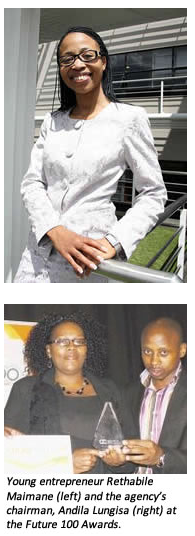
Thousands of young entrepreneurs between the ages of 18 and 35 years can be nominated or nominate themselves to participate in the Future100 programme under the theme “Discovering South Africa’s 100 most inspiring young entrepreneurs”.
The primary target of the programme is to identify young entrepreneurs whose stories and achievements will serve as inspiration for other aspiring entrepreneurs and to show them that where there is a will to succeed there will be a way.
Rising stars of entrepreneurship
The top 100 young entrepreneurs were chosen from a pool of more than 5 000 candidates. The winners are encouraged to mentor, provide information, and lobby for increased business development for young entrepreneurs as ambassadors of youth entrepreneurship in South Africa.
Onesimo Ngumbela the overall-winner
Owner of TravelStop based in Gauteng and Rocksolid Properties based in the Western Cape, was the overall winner and walked away with the CEO Award of R100 000. Onesimo is the manager of the Sandton-based company Travelstop. They specialise in events, conferences, car hire, accommodation and airfares.
With her motto of ‘Dream big’!, Onesimo is also an entrepreneur, consultant and motivational speaker. She is widely recognised as one of the most dynamic woman of her generation in South Africa, especially in the Western Cape and Eastern Cape.
Rethabile Maimane
Maimane owns and runs Golden Goose Catering & Cake Decorating in Welkom in the Free State. Superior performance is clearly a function of every entrepreneur who has a taste for success like Rethabile Maimane. Maimane started her company in 2003, which currently employs four people. The business started as a home-based small-scale enterprise, with an initial investment of R200 in 2003. It later grew into a full-time business as the demand for the cakes they baked for special occasions grew.
day I make a hundred-fold more than the initial investment in 2003. I felt elated when I was told that I had made it to the top 10. It meant that I had achieved something significant. My peers see me as an inspiration,” said Maimane.
She said Golden Goose specialised in cake decorating, which used to be a whites-only domain. “We have diversified and are also offering decorations at functions and flower arranging,” Maimane added.
Commending Maimane, South African Youth Chamber of Commerce president Thapelo Maleke said, “Superior performance is clearly a function of every entrepreneur who has a taste for success like Rethabile Maimane. She has an enormous amount of control over what she does and how much effort she puts into her own enterprise.”
Felicia Buthelezi 
From 2003 to date, Buthelezi has won various awards from organisations such as the Business Women’s Association, Zululand Chamber of Business, the Umyezane Award, Black Management Forum and the Black Business Quarterly. Buthelezi’s business, Fisokuhle Multi-Services, specialises in cleaning services, garden maintenance and safety and security.
Buthelezi has always believed in herself. Growing up Eskhwawini she didn’t have much to explore and was not exposed to the outside world. It was all about going to school and back home. “To make things worse, my parents were strict and against me having friends, so I only socialised at school. I am a first born with three siblings raised by both parents until 1995 when my mother, who was the bread winner of the family, passed away from an asthma attack.”
After matriculating, Buthelezi moved to Ulundi to look for a job so she could look after her father and siblings. She worked as an administration consultant at Old Mutual and in 1998 registered with Southern Business School for a course in human resource management. “I had to grow up very fast. I had to be strong for my siblings and for myself. My road has never been an easy one. My dream started when I was transferred to Johannesburg, where I met a lot of successful women, most of whom were fearless and enterprising.”
In 2002, Buthelezi registered her company and her business grew to a point where she had to resign from Old Mutual. She moved back to KwaZulu-Natal where she sought to contribute positively to ordinary people in her community, especially people who are referred to as under-privileged.
Buhle Dlamini
Buhle Dlamini is founder and managing director of Young and Able cc. He is also a professional speaker and author of five books including The successful Young Entrepreneur.
“Young and Able cc, is a business and personal development consultancy that has provided training and professional speaking services since 2003,“ said Dlamini.
“The recognition that came with winning the Future 100 entrepreneurs award has been a welcome boost to the business image. We have since grown our client base to include some of the top blue chip corporate companies, providing them with talent development services. Our reputation and track record has been our key to getting more business, but having won the Future100 entrepreneur award has helped me to be taken seriously as an entrepreneur.”
The media exposure has led to other media exposure, which has boosted marketing of the company. “As a young entrepreneur you have to work extremely hard to be taken seriously in business and being recognised for your efforts as in receiving this award can give you an edge
My advice to other young entrepreneurs trying to make it in business is this: Be professional from day one! Take your craft seriously and your customers will take you seriously too. Also manage your business finances carefully by having proper procedures in place to manage cash-flow. And lastly, love what you do, since you’ll be doing a lot of it. There is no point being in business doing something you are not passionate about, if you do that you are sure to struggle. So, if you love what you do and go for it, you are sure to win.”
Ofentse Sebitlo with Andile Lungisa
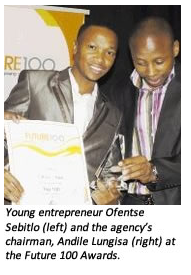
Young entrepreneur Ofentse Sebitlo (left) and the agency’s chairman, Andile Lungisa (right), at the Future 100 Awards.
Twenty-eight-year-old Ofentse Sebitlo heads Montsamaisa Bosigo, a Mmabatho-based consulting firm that provides mostly small and medium enterprises with services such as bookkeeping, business and financial administration, business feasibility studies, due diligence facilitation, business plan development and legal compliance.
The company also helps with coaching and mentoring of aspirant merchants, local business managers and the education and training of business community members in information and communication technology. Their work has so far been endorsed by business industry leaders including the Small Enterprise Development Agency, Mafikeng Development Zone and Productivity SA.
Sebitlo says the award means a lot to him. “It is great to be recognised seeing that there were many applications and candidates that were reviewed,” he said.
He says there is always room for growth. “I would like to see Montsamaisa Bosigo working together and forming partnerships with bigger companies in future. The biggest challenge is funding. There are not enough institutions to turn to for funding,” said Sebitlo.
Thamsanqa Maqubela
Maqubela is a special talent who is making his mark in the corporate sector by challenging the youth of South Africa to ‘Be not afraid of greatness’.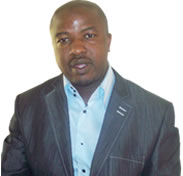
Maqubela is the founding chairman of Qhubela Holdings, which was established in 2002 and is situated in Kempton Park, Gauteng. Maqubela’s 100% black-owned and managed company provides corporate clients with publication services, including design, layout and printing, copy writing, editing and proofreading; as well as with multimedia photography of various events, fulfilling strategy facilitation and team building, and corporate social investment and responsibility services.
He is also the Executive Director of the SA Graduates Development Association, a position he has held since November 2010. SAGDA is an authority in graduate empowerment in South Africa and has established relations with universities, SETAs, FE Colleges, private sector companies and many government departments through Maqubela’s leadership. His quest is to provide work exposure to the 600 000 unemployed graduates in the county.
Qhubela Holdings’ subsidiaries include Customer Care South Africa, the Intellectual Property Institute and the Codesa Museum. He is also reputedly an internationally recognised marketing specialist and scholar, with local and international awards and has a national marketing diploma (cum laude) from the Vaal University of Technology.
He was an exchange student at Australia’s Charles Stuart University in 1995 and also visited the Korea Development Institute School of Public Policy and Management for an MBA on strategy and marketing in Seoul. Maqubela is currently completing a Master of Philosophy degree, majoring in political economy, with the Nelson Mandela Metropolitan University.
Kagiso Dumasi 
Kagiso Dumasi heads West Chauffeurs together with fellow young entrepreneur Sola Owoloja. They offer executive transport services, including point-to-point transfers and chauffeur drives, corporate and leisure services like venue-sourcing and bookings for functions, tours, the organisation of exclusive getaways and events, corporate road shows, concierge and VIP services, including qualified and specialised protection services or bodyguards.
West Chauffeurs was launched in January 2008 with the goal of becoming a formidable service-provider in the premium transport market. The company provides complete and professional management of outsourced travel desks or concierges within hotels, as well as drivers, tourist guides and vehicles matching the guests’ and hotels’ specialised needs.
The company’s customer service concept and philosophy is to provide services for the discerning business and leisure traveller who expects comfortable, safe and elegant transport with tailored itineraries and tour options.
Tom-Ross Fortuin 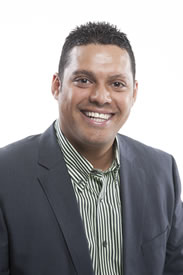
Fortuin leads TRF Sport, which started trading in August 2004 at his family home in Ridgeworth, Bellville, in Cape Town. The space was originally intended to be a third garage, but was converted into an office.
After spending a year in Scotland playing his favourite sport, cricket, for Stirling County, Fortuin returned to South Africa to pursue his passion and start his own business.
Fortuin says the primary nature of the business is buying, selling, distribution and manufacturing of clothing, promotional items, safety and sport equipment. The start-up funding was an inheritance from his late grandfather, which Fortuin chose to invest for his future, while contributing to employment and job creation in South Africa.
Today, TRF Sport, which is 100 per cent black-owned, employs 20 staff members, including two business managers.
Ashley Shaw
Ashley owns Lightspeed Word Press Development, a Cape Town-based web development studio specialising in building websites and social networks with WordPress and BuddyPress applications.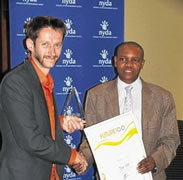
LightSpeed, which opened its doors in 2003 as a service- provider for specialised network support and computer hardware sales, has won its founder Ashley Shaw a Platinum Award in the Future 100 Entrepreneur Awards.
Shaw, who leads a core team of 11 developers in website development and related projects, said that in 2007, Light Speed Word Press Development had moved on to website development. Their clients have included MTN, Media24, the Mail & Guardian, the Democratic Alliance and Touchline Media.
Ismail Dhorat
Dhorat who founded Zyelabs in 2006, provides telecommunications-related consulting services in South Africa and abroad. In the area of web development, Zyelabs has provided services to large companies, including Kentucky Fried Chicken and Metro FM, as well as to religious organisations and online catalogues, mostly for retailers.
Significantly, Zyelabs was selected by the Innovation Hub as one of the emerging businesses run by young people to be included in the hub’s incubation project, which helps rising or start-up ventures. The Innovation Hub - an initiative  of the Gauteng economic development department and its business development corporation, Blue IQ is widely regarded as Africa’s first internationally accredited science and technology park and is a full member of the International Association of Science Parks.
of the Gauteng economic development department and its business development corporation, Blue IQ is widely regarded as Africa’s first internationally accredited science and technology park and is a full member of the International Association of Science Parks.
The hub, as a hive of innovation and knowledge creation, is linked to the fast-moving world of global inter-connectivity, providing a unique space for high-tech entrepreneurs, world-class businesses, academics, researchers and venture capitalists in an environment that promotes innovation.
Health: Fight against TB yielding positive results
Health: Fight against TB yielding positive results sadmin
According to a report released during a provincial TB and HIV seminar held in December last year, more than 81 per cent of people who were screened, tested and diagnosed with TB in the province's public health facilities, have been cured. This is an increase from 64 per cent in 2004, to 81 per cent in 2011.
"These positive results were achieved because of an intensified TB management programme, which involved door-to-door campaigns by community healthcare workers and directly observed treatment support," said Simon Zwane, head of communication at the Gauteng Department of Health and Social Development.
"Through this approach, defaulters were traced and brought back for treatment. This has also helped ensure that more people take the test."
GeneXpert 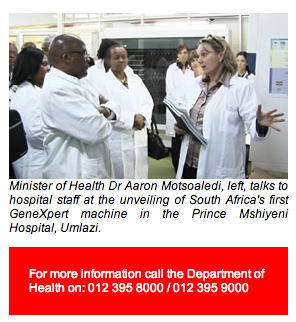
Gauteng Department of Health and Social Development MEC Ntombi Mekgwe said that in the 2010/11 financial year, 52 118 new TB cases were diagnosed. The province is expecting an increase in the number of diagnosed cases and in the cure rate during the current financial year. The reason for this is the introduction of the two GeneXpert machines at Chris Hani Baragwanath Academic Hospital and Edenvale Hospital.
The machines, which were introduced in March last year, reduce the time to diagnose TB from two weeks to two hours. "Between March and November 2011, 16 189 people were tested using these machines. Some 2 195 patients tested positive and are currently undergoing treatment," said Mekgwe.
Complete treatment
Districts have also intensified efforts to improve TB management by increasing awareness about the disease, educating people to complete treatment and educating communities on infection control.
Mekgwe urged patients to complete their treatment to avoid getting multidrug-resistant TB. The department's awareness campaigns emphasises that TB is curable after six months of treatment, even among patients living with HIV. "I would like to appeal to everyone who may have symptoms to seek treatment before it is too late," she said.
What are the signs of TB?
The signs of TB include:
- a persistent cough for two weeks or more
- night sweats
- weight loss
- chest pains
- coughing up blood
- fever and chills
- loss of appetite and tiredness.
-BuaNews
Health: Going strong 17 years later
Health: Going strong 17 years later sadminHealth
Going strong 17 years later
Nomusa Njoko had been an asthma sufferer since the age of 12, an affliction she never really outgrew. At 22, the disease appeared to rear its ugly head again and Nomusa went for an asthma check-up. At the time, it sounded a bit strange when the doctor suggested that she had an HIV test as she was not responding as well to her prescribed medication as in the past.
"The doctor said that I fitted the profile of an HIV positive person," Nomusa explained. True to his suspicion, she tested HIV positive, something that never existed in her world.
"I was devastated and frustrated. I didn't know how I ended up with the virus. There was a lot of confusion at the time because the doctor told me that I had only three months to live."
 AIDS activist
AIDS activist
Today, 39-year-old Nomusa is one of South Africa's well-known AIDS activists and is one of the country's most sought after gospel artists.
Nomusa has been living with HIV for the last 17 years and while many may think that the virus is a death sentence, she urges those who are positive to live life to the fullest and look after their health.
"I realised that I had contracted the virus from a partner I had at the time. I then told my former partner. We were no longer together at the time; it was a short-lived relationship. I told him and based on his reaction, it seemed as if he already knew."
At 22, Nomusa was like any other young adult, trying to figure out who she really was, enjoying life with her friends and family. "Suddenly I had to grow up and deal with issues that other 22-year-olds didn't have to think about."
While initially in shock, her family supported her throughout her illness and they still do. In 1995, when she publicly disclosed her status, some members of her community were hostile towards her.
"Stigma is rife... to eliminate stigma, it is going to take our leaders to pioneer disclosure. It needs to start from the top and it will be easier for ordinary people to disclose.
Spread the message
The World Health Organisation estimates that the number of people living with HIV in South Africa for 2010 stands at 5,6 million. Of these, 518 000 were children under 15 years, while almost 3 million were adult females over the age of 15.
The National Strategic Plan on HIV and Aids 2012 - 2016 was launched in December last year. One of the key decisions included in the plan is the development of a single integrated strategy for HIV, sexually transmitted infections and TB. This is primarily due to the high co-infection rate between HIV and TB, as well as HIV and STIs. South Africa faces one of the worst dual epidemics of HIV and TB in the world at 73 per cent.
Nomusa commends government's response to the virus, but believes more should be done to educate people and raise awarenss.
"I have suffered from TB three times and the failure to diagnose early is the problem. It is a major killer among HIV positive persons, even those on treatment," she explains.
ARVs do not address opportunistic infections. It is critical that when one tests for HIV, they test for TB as well. That will ultimately prevent deaths.
Being a musician has helped Nomusa to spread the message. It is through her music and her job as Social Marketing and Mobilisation Deputy Manager at the KwaZulu-Natal Department of Health that she speaks about the effects of the virus.
"Every situation is unique... It can never be the same. It lives in your body in different ways. You need to know your body and the virus better than anyone else. Don't let the virus direct or order the steps of your life. Whatever dreams you have, live them or create new dreams," she urges.
-BuaNews
Health: You can beat breast cancer
Health: You can beat breast cancer sadminWho is at risk?
Anyone can get breast cancer, but you are more at risk if your diet is high in fat, if you don't exercise regularly, are overweight, drink more than two glasses of alcohol per day and if you have a family history of breast cancer.
You are also at a higher risk if you are over 40, if you started your period at a young age, went through menopause at a late stage and if you had children after the age of 40 or not at all.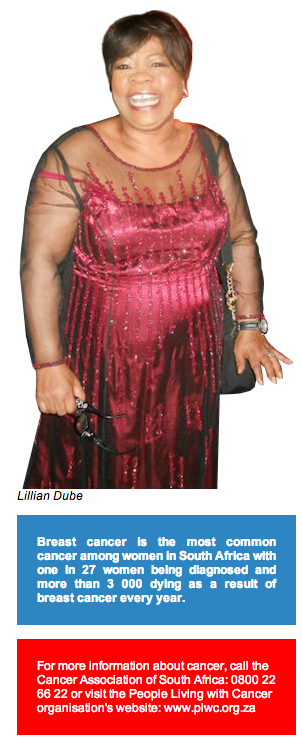
Symptoms include a lump in your breast, unusual swelling, puckering of the skin (like an orange peel), a sore or rash, pain, discharge from the nipple and indentation of the nipple (instead of pointing out and forward, it is pointing sideways or inwards).
Lillian Dube
All cancer patients and survivors will tell you that finding out they had cancer and then undergoing treatment, was one of the biggest challenges they had ever faced. The physical effects of the treatment are tough with a many side effects, but it is also a psychological and emotional challenge.
Popular actress, Lillian Dube, is a breast cancer survivor who didn't let the disease dampen her positive spirit. The bubbly and outspoken actress is renowned for her role as the matriarch and matron Sister Bettina in the TV drama Soul City. She also stars in SABC 2's Muvhango.
Lillian is a very busy lady; everyone wants a piece of her. Her phone keeps on interrupting us, but she manages to tell me how her acting career started. "I was encouraged by my son to get into TV back in the 1980s. He heard on the radio that there were auditions in Johannesburg. He even got a telephone number and address for me," she says. "At that time I was working as a credit clerk at a retail."
She is now working on season two of the TV series, Skwizas, which is being produced by her production company: Lillian Dube Productions.
Cancervive campaign
Diagnosed with the disease in December 2007, Lillian was operated on in January 2008 to remove the tumor. She subsequently received chemotherapy treatment every three days for four months and radiotherapy for 30 days as a safety measure to ensure that potentially remaining microscopic cancer cells were totally destroyed.
"I am an only child, I have only one child and I'm a divorcé, so I received most of the support from the community and my co-workers," said Lillian.
"I am active in creating breast cancer awareness through talks and presentations. I'm now part of the new Cancervive campaign that educates and creates awareness about the shy-cancers. I'm also a member of Bosom Buddies, which is another breast cancer support group, and I have founded a Breast Health Foundation in Lesotho in 2008"
Treatment
Lillian's cancer was discovered in a routine check-up. The first mammogram didn't detect the tumor; the radiographer only noticed it when she went again the following year. "Because early detection is key, I appeal to women over the age of 40 to go for annual mammograms," she said.
Treatment for breast cancer depends on the stage at which the cancer is detected. It may include surgically removing the tumor and a mastectomy – removal of the affected breast.
A double mastectomy is when both breasts are removed. Radiotherapy is administered to kill cancer cells that may have remained after surgery. Chemotherapy is when powerful drugs are used intravenously and in tablet form to kill the cancer cells internally.
-Refilwe Thobega
International relations: SA/Swazi rail line heads for success
International relations: SA/Swazi rail line heads for success sadminInternational relations
SA/Swazi rail line heads for success
South Africans and their Swazi counterparts are expected to enjoy various economic spin-offs from the development of a 146-kilometre rail line between the two countries.
The Transnet Freight Rail infrastructure project is expected to create many jobs for locals.
“Transnet and Swaziland Railways have agreed to jointly develop a 146-kilometre line from Lothair in Mpumalanga to Sidvokodvo Junction in Swaziland as well as upgrading adjacent rail networks in South Africa,” said Transnet group chief executive Brian Molefe.
“In doing so it will provide an unprecedented economic boost to the region.”
Molefe said the line was aimed at being a coal transport route and would enable freight trains up to 200 wagons in length to travel across the border.
He said it was better for coal to be transported via rail as opposed to trucks. This was cost effective for unprocessed minerals and bulk products.
The new line will also handle general freight volumes separate from coal, and will add new rail transport capacity of 15 million tonnes to the region.
The first trains on the new line are expected to start transporting the products in three years. The last rail project of this size was the Richards Bay Line, dating from 1976.
“This (project) is of great historical and economic importance, and we are all immensely proud of this fact,” said Molefe.
“Rail infrastructure is undergoing a major renaissance as an investment and as a vehicle for the upliftment of citizens in an environmentally friendly and cost effective manner,” Molefe said
-BuaNews
International relations: Shaping new models
International relations: Shaping new models sadminInternational relations Shaping new models
Shaping new models
The annual meeting of the World Economic Forum took place from 25 to 29 January in Davos, Switzerland, under the theme: "The Great Transformation: Shaping New Models".
Leaders shared insights on what has changed fundamentally in the world, explored emerging conceptual models and collaborated on the risks and opportunities that lie ahead. As is the tradition of the Annual Meeting of the WEF, the programme focused on business and economics to generate ideas and the collaborative spirit needed to manage the future course of world economic affairs.
International relations: Stronger defence relations with Cuba
International relations: Stronger defence relations with Cuba sadminInternational relations
Stronger defence relations with Cuba
South Africa and Cuba have strengthened cooperation in defence by signing a memorandum of understanding.
Defence Minister Lindiwe Sisulu and Cuban Vice-President of the Council of Ministers Ulises Rosales del Toro signed the Agreement on Defence Cooperation in Pretoria.
“Cooperation in areas such as military veterans, defence industries, military health, training and exchange programmes are particularly important. We must follow these areas of cooperation with the enthusiasm it deserves,” Sisulu said.
South Africa could also learn from Cuba about its citizen force. “Furthermore, it is important for us to learn from you about the citizen force, which will make our people responsible during any human disaster at any given time,” she added.
Sisulu said South African youth could learn from the Cuban value system, characterised by a deep sense of patriotism, culture and work ethic.
“We can learn a great deal from the armed forces of Cuba and I believe that Cuba can contribute and share its expertise with our defence force to benefit South Africa, the region and the continent.”
She noted the long-standing relationship South Africans shares with Cuba, adding that Cubans have supported us in the fight against apartheid.
Del Toro said the agreement would help both countries prepare for the future at a time of new weapons, strategic thinking and methods of fighting.
International relations: Wish-list of ideas to strengthen global ties
International relations: Wish-list of ideas to strengthen global ties sadminInternational relations
Wish-list of ideas to strengthen global ties
South Africa has, as President of the United Nations Security Council (UNSC), presented a wish-list of priorities that would give the African continent, particularly the African Union (AU), a voice in the global body. South 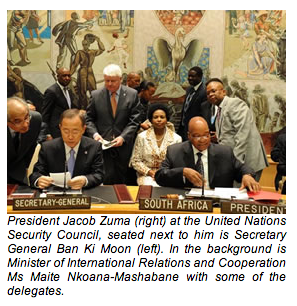 Africa assumed the presidency of the UNSC, which rotates monthly among its member states alphabetically, for the month of January.
Africa assumed the presidency of the UNSC, which rotates monthly among its member states alphabetically, for the month of January.
President Jacob Zuma presented South Africa’s ideas for giving Africa a stronger global voice during a sitting of the UNSC in New York in January where South Africa assumed presidency of the council.
The Presidency of the UNSC offers an opportunity to promote a theme that is of particular regional or national importance. In this context, South Africa utilised its Presidency in January to continue exploring concrete measures for strengthening the relationship between the United Nations (UN) and regional organisations, in particular the African Union (AU), to ensure international peace and security.
President Zuma’s first proposal, a resolution that will further enhance the ties between the UN and sub-regional organisations, particularly the African Union, was unanimously adopted.
Resolution 2033 urges the two bodies to work closely together in the areas of prevention and resolution of conflicts in Africa.
Peace and security
His second proposal was regarding the possibility of developing and defining modalities for cooperation and decision-making between the two institutions.
This, he said, would assist in addressing the challenge of how the UNSC reacts to requests, suggestions and proposals by the AU Peace and Security Council.
“This will assist in ensuring uniformity, consistency and certainty when the two institutions are pursuing a common objective,” President Zuma told the UNSC.
Division of labour
Another proposal was for a clear division of labour - which would be crucial to the success of the strategic partnership between the two organisations.
According to President Zuma, this has to take into account the different competencies, capacities and comparative advantages of the two bodies.
Avoiding conflicts
Finally, the issue of capacity building and sustainable resource allocations, he said, remained a fundamental challenge. This was something that the AU needed to discuss with the UN to explore solutions.
Using last year’s Libyan conflict as the base for his argument, President Zuma said building a stronger relationship between the two bodies was critical in avoiding conflicts. He said the AU’s plan was overlooked and instead, Nato forces bombed Libya.
“The consequences of actions that were carried out in Libya in the name of the UN Security Council have spilled over into other countries in the region. A problem which was confined to one country, Libya, has now grown to be a regional problem,” he said.
“The lesson we should draw from the Libyan experience is that greater political coherence and a common vision between the AU and the UN are critical in the resolution of African conflicts. The views of the African Union must be listened to if we are to strengthen our relationship and prevent further conflict,” said President Zuma.
Moving Africa forward
African countries are pushing for the reform of the UN, saying the continent’s concerns and voices were not being considered, despite the fact that about 70 percent of the UN agenda concerned Africa.
African countries believe they should be well represented in the UN and its regional bodies must also be given a chance because they were familiar with the issues and often understood the dynamics of the conflict.
President Zuma said all Africa needed was a chance as they had in the past decade sufficiently demonstrated the political will and commitment to rid the continent of all conflicts and wars.
“We are working hard to move the continent forward to a sustainable path of socio-economic development and prosperity,” he added
Internship programme 2012/13 GCIS
Internship programme 2012/13 GCIS sadminEmployment news
Internship programme 2012/13 GCIS
Government Communication and Information System hereby offers internship opportunities to South African graduates and post- graduates.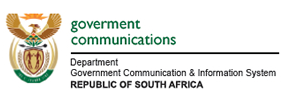
Duration: 12 Months from 01 April 2012-31 March 2013
Applications are invited from candidates in the following disciplines/fields of study:
- Financial Management
- Supply Chain Management
- Risk Management
- Human Resource Management
- Auditing
- Policy Analysis Research
- Development Communication
- Community Development Studies
Who is eligible to apply
Unemployed South African graduates/postgraduates, with a tertiary qualification in any of the above mentioned fields of study, who have not been previously employed under any internship programme.
Requirements
Applications must be submitted on Z83 form, obtainable from any public departments or www.gov.za, stating the field for which the intern is applying (from the above list). A CV, certified copies of certificates, academic transcripts, and Identity document must be attached. Failure to submit the required documents will result in the application not considered.
Please forward the applications to Government Communications and Information System (GCIS) P/Bag X745 Pretoria 0001 for attention Thabiso Mphahlele.
Interns will be placed in Pretoria (6), Mpumalanga (1), Eastern Cape (1), KZN (1) and Free State (1)
Enquiries
Rina van den Berg, Tel: 012 314 2282
or
Piet Lebelo, Tel: 012 314 2816
Note: Will receive monthly stipend. Short-listed candidates will be required to attend interviews to determine their suitability. Correspondences will be limited to short-listed candidates only. If you have not been contacted within 3 months of the closing date please accept that your application was unsuccessful.
Closing date
17 February 2012
Know your Minister: 20 000 homes encourage ownership
Know your Minister: 20 000 homes encourage ownership sadmin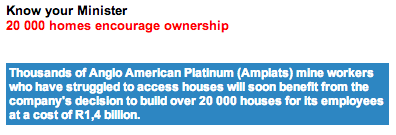
Amplats will build 12 000 houses in North West and 8 000 in Limpopo over the next 10 years, as part of the Each-One-Settle-One campaign, launched by Human Settlements Minister Tokyo Sexwale last year to help government  address the housing backlog estimated at more than 2,3 million.
address the housing backlog estimated at more than 2,3 million.
According to Amplats CEO Neville Nicolau, the company did not want its workers to live in isolation at the mines, but to be fully integrated in the communities from where Amplats operates.
'Amplats' housing business model is based on the principle that employees must own houses and lessen their dependency on company providing accommodation both on mine and off mine. The main reason of this approach is to encourage and promote home-ownership among its employees at all levels," said Nicolau.
For Human Settlements Minister Tokyo Sexwale, the campaign is starting to bear fruit. "This is what we had in mind when we thought of the concept of Each-One-Settle-One: We need each other – corporates and government. It is through these partnerships that we can succeed as a country," Sexwale said. He said this kind of investment was good for both employers and employees.
Amplats had also helped the Thabazimbi Local Municipality by providing basic infrastructure such as roads and sanitation.
-Samona Murugan
Know your Minister: Each-One-Settle-One: houses for all
Know your Minister: Each-One-Settle-One: houses for all sadmin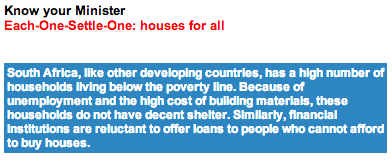
This has resulted in many families being forced to live in poorly constructed houses in unsuitable areas that exposed them to floods, health hazards and fire. Government has built over 3 million subsidised housing units since 1994. In this regard, South Africa is the only country with such a rate of delivery.
However, because of the increase in the number of homes needed, a decrease in the size of homes and people migrating to urban areas in search of employment, South Africa has a high number of homeless people in over 2 500 slums. This has resulted in increased overcrowding in backyard dwellings. Currently, there is a housing backlog of 2,1 million housing units which means approximately 12 million people do not have decent housing.
Human Settlements Minister Tokyo Sexwale launched the Each-One-Settle-One Campaign to the Johannesburg Stock Exchange top 200 companies. The aim of the campaign is to motivate stakeholders, private sector institutions, donor agencies and ordinary citizens to help the department to reduce the housing backlog.
How will the contribution of the private sector and donors make a difference?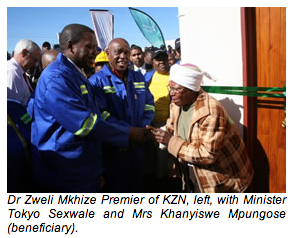
By participating in the campaign, the private sector, donor agencies and citizens will contribute towards sustainable human settlements by providing people with shelter and dignity. Their assistance will further help to reduce the housing backlog and in doing so increase the number of houses to the homeless. By helping to construct homes, you are not only satisfying the need for shelter but you also help stimulate the economy. Human settlement is not just about building houses, it is about transforming our cities and towns and building cohesive, sustainable and caring communities with closer access to work and social amenities.
How can companies or individuals play their part?
- By supporting the building of houses and other programmes.
- By devising strategies for creating jobs, while improving human settlements.
- By donating services, expertise, building materials, time or land. This can include professional services such as engineering, accounting, architectural and legal.
- By helping to provide permanent housing for domestics and employees residing on an employers' property.
If I don't have money, can I still help?
No contribution is too big or too small. The department is willing to accept any amount you can afford. But if you can't donate funds, simply donate your time towards helping us build homes within your community or neighbouring settlements.
I already pay taxes; why should I pay for what government is paid to do?
Unless we take responsibility to build houses for our citizens, South Africa may find itself in a catastrophic recession, similar to that of the United States. It will take about a decade to settle the current backlog of 2,3 million houses and that excludes new houses.
By doing your bit, you are not only helping to remove the financial constraints and capacity challenges currently faced by the department, you will also help achieve the national goal to build 220 000 houses per year. In the process, you will contribute actively towards a sustainable economy.
What guarantee does the public have that the funds will be spent responsibly?
We have taken great care in ensuring that contributions are made into a separate bank account that will be overseen by an independent board of trustees.
What are the socio-economic benefits from the campaign?
The programme presents several economic spin-offs including the creation of tens of thousands of jobs, skills development, local research and development, as well as improved individual dignity and community upliftment.
-Samona Murugan
Know your Minister: Meet Minister Tokyo Sexwale
Know your Minister: Meet Minister Tokyo Sexwale sadmin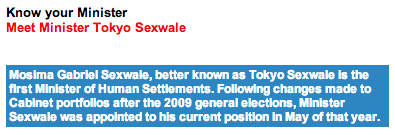
Previously the Premier of Gauteng, Minister Sexwale also sat on the Board of Directors for the 2010 FIFA World Cup and was a member of the World Cup 2010 Preparatory Committee. He is a member of Brookings Institution's 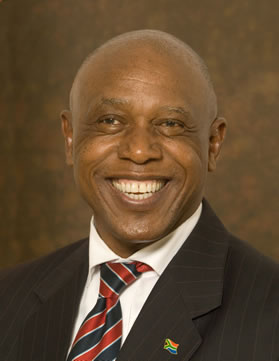 International Advisory Council, chairman of Mvelaphanda Holdings (Pty) Limited and Mvelaphanda Group Limited, Northam Platinum Limited and Trans Hex Group Limited and is a director of ABSA Group Limited and Gold Fields Limited.
International Advisory Council, chairman of Mvelaphanda Holdings (Pty) Limited and Mvelaphanda Group Limited, Northam Platinum Limited and Trans Hex Group Limited and is a director of ABSA Group Limited and Gold Fields Limited.
Minister Sexwale became a member of Steve Biko's Black Consciousness Movement in the late 1960s and became a local leader of the radical South African Students' Movement. In the early 1970s, he joined the African National Congress' armed wing, Umkhonto we Sizwe ("spear of the nation").
While in Swaziland, he completed a Certificate in Business Studies at the University of Botswana, Lesotho and Swaziland. In 1975, Sexwale went into exile, undergoing military officers' training in the Soviet Union, where he specialised in military engineering.
On his return to South Africa in 1976, Sexwale was captured and, along with 11 others, was charged and later convicted of terrorism and conspiracy to overthrow the government. He was sent to the Robben Island maximum-security prison to serve an 18-year sentence. While imprisoned at Robben Island, he studied for a BCom degree at the University of South Africa.
After his release in June 1990, Sexwale returned to Johannesburg, where he served as head of the public liaison department of the ANC Headquarters. He was subsequently appointed the head of special projects, reporting to the ANC's military headquarters. In September 1990, he was elected to the executive committee of the ANC in the Pretoria-Witwatersrand-Vereeniging region and in 1991, he became chairperson of the ANC in the region.
Learning is a life-long experience
Learning is a life-long experience sadminAdvice and Events
Learning is a life-long experience
All is not lost for matriculants who did not perform as well as expected in the National Senior Certificate examinations. The Department of Higher Education and Training urged them not to lose hope, as learning was a life-long experience with various options within the post-school system.
South Africa’s post-school education and training sector includes among, others universities, universities of technology, further education and training colleges and sector education and training authorities (SETAs).
“Our Further Education and Training (FET) colleges are institutions ideally suited for those wishing to make up their ‘matric’ and for those wishing to study subjects that will lead to a vocational career path,” said Higher Education and Training Minister Blade Nzimande.
“Those who wish to enter the world of work or need to increase their skills, can consider the options of learnerships, apprenticeships and skills programmes through one of the 21 SETAs which cover each economic sector in South Africa,” Mzimande said.
There are 50 FET Colleges with 264 campuses throughout the country, which offer a range of programmes that cater for most students’ needs and interests. Subjects range from engineering, business studies, art and music to food and hospitality services.
The 23 universities in the country will provide access to approximately 180 000 new entrants in 2012 for those wishing to pursue their studies in the fields of business and management; science, engineering and technology; humanities and education.
Now you can collect your grant anywhere in South Africa
Now you can collect your grant anywhere in South Africa sadmin
It will also allow SASSA to achieve its objective of standardising its services and reducing overall costs.
The agency said the contract would run over a period of five years at a cost of about R10 billion, with the winning bidder expected to distribute grants to the value of about R500 billion over the same period.
Evaluation
Up to 21 companies submitted bids for one or more of the provinces, resulting in 128 bids for evaluation.
The bids were subjected to rigorous evaluation and adjudication in conformity with the bid document. This entailed a functionality evaluation in assessing each bid against the criteria, short-listing and financial and preference evaluation.
Saving
Cash Paymaster services has been paying social grants since 2006, but it is for the first time that SASSA awards a payment contract of this nature. It was previously extended based on the provincial contracts.
Over the past five years the unit costs for pension payment increased from about R26 in 2006/07 to R34 in 2010/2011.
In the current contract, the unit cost has been capped to R16,50 for the duration of the contract. This would bring saving of R3 billion over a contract period of five years.
-BuaNews
On the move to a better future
On the move to a better future sadminEmployment news
On the move to a better future
Thousands of young people are set to benefit with the much-needed skills from an apprentice programme involving state-owned logistics group Transnet, which recently signed a contract with General Electrical to build diesel-electric locomotives in South Africa.
Speaking at the signing ceremony, Public Enterprises Minister Malusi Gigaba said he was happy that the deal to build the more than 100 locomotives in South Africa included the apprentice programme.
“This will expand our country’s skills base and transfer technical knowledge to young people who struggle to join labour market due to lack of skills.
Locomotives
In 2009, Transnet bought 100 diesel-electric locomotives from General Electric (GE) and the latest deal sees an additional 43 diesel-electric locomotive to the original 100.
The 43C30ACi diesel-electric locomotives will be built by Transnet Rail Engineering at its Koedespoort plant outside Pretoria.
Transnet Chief Executive Officer Brian Molefe said 65 per cent of the late contract value would have local content as outlined in the government’s Competitive Supplier Development Programme.
This programme has to do with aspects such as localisation of parts and production, skills transfer and development, technology transfer, industrialisation, social investment and job creation.
New jobs
The latest contract between Transnet and GE will see a total of 337 new jobs being created over and above the apprenticeship programme that will benefit thousands of young people during the assembling of the locomotives at Koedespoort.
Almost 30 per cent of the components of the 43 diesel-electric locomotives to be assembled at Koedespoort will be local. This represents a 10 per cent increase from the 20,3 per cent local components used in the 100 locomotives bought through the 2009 deal.
The 143 locomotives will be transporting mined products such as coal on Transnet’s Phalaborwa-Richards Bay line as well transporting iron-ore on the Sishen-Saldanha line as well as other goods on the Witbank-Nelspruit-Komatipoort line and to transport coal to Eskom power stations.
Education and skills
“Exactly eleven month ago we saw the delivery of locomotives by General Electric to Transnet which are part of our plans to revitalise South Africa’s rail infrastructure capacity. Through this contract, we are giving practical effect of taking urgent steps to place education and skills development at the centre of our transformation and development agenda,” said Minister Gigaba.
Higher Education and Training Minister Blade Nzimande also hailed the locomotive building programme as a first step in the right direction in creating a skills base among young people so that they could play an important role in shaping the country’s economy.
“We are happy about this deal between Transnet and General Electric. In fact, we lost massive opportunities to skill a number of our young people during the building of World Cup stadia. Therefore, this time we are happy that there would be opportunities for real skills transfer in the form of apprenticeships and there will be a connection with workplace placement as well,” said Minister Nzimande during the launch of the Green Paper for Post-School Education and Training.
-Mbulelo Baloyi
Rural development: A cut above the rest
Rural development: A cut above the rest sadmin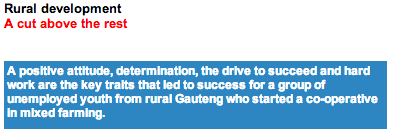
Struggling to find jobs was not an excuse to live in poverty for a group of two young unemployed men and five women. Rather than sitting back and waiting for something to come their way, they decided to pull their resources together to start a co-op.
Zivuseni Agricultural Co-operative, which started off as a small egg-producing business, has since grown to become a successful mixed farming operation outside Nigel on the East Rand with laying hens, livestock and crops.
Objectives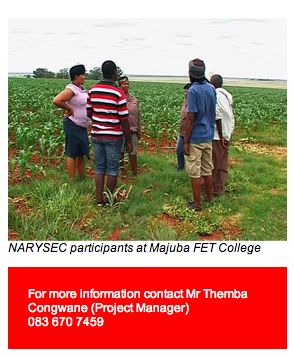
With support from the National Development Agency and the Department of Rural Development and with mentorship from Agri Gauteng, they are now well on the way towards becoming one of the most successful co-ops in Gauteng.
“Our main objectives are to provide reliable services, to produce agricultural products that are affordable and of good quality, to create job opportunities and to develop skills through providing training opportunities,” said Zivuseni project manager, Themba Congwane.
Zivuseni supplies eggs to Central Meat Butcheries in Nigel and Real Meat Butchery in Brakpan. In addition, the co-op sells livestock to different abattoirs and supply maize to AFGRI.
Excellent service
The members of Zivuseni realise that being part of a competitive sector is tough and to stand out from their competitors they have to provide excellent service and high-quality products at affordable prices. They ensure that their products are delivered promptly and in good condition and that their livestock are healthy. In addition, they encourage after sales feedback from their clients so that they can continuously improve their service.
Future plans include building a layered structure to accommodate about 20 000 chickens, employing more skilled workers, keeping up-to-date with the latest agricultural technology and increasing their livestock to at least 100 beef cattle and 300 sheep.
-Sekgabo Kedijang
Rural development: Opportunities knock for rural youth
Rural development: Opportunities knock for rural youth sadmin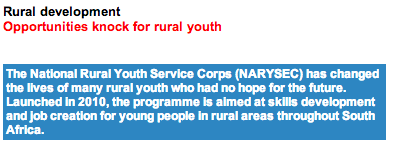
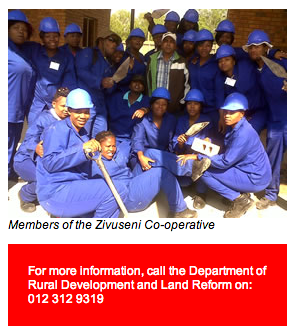
NARYSEC caters for youths between the ages of 18 and 35 in about 3 300 rural wards. It helps them to enrol at colleges for a period of 24 months to equip them with theoretical knowledge and practical skills so that they can find jobs, create job opportunities for others or respond to the development needs of their communities.
Puleng Buthelezi has been part of NARYSEC since its inception; she completed training in different skills at the Majuba FET College.
"Being part of the NARYSEC programme has changed my life drastically, it has minimised the pressures of funding my education, while the skills I have obtained will help me to improve my community" said Puleng.
Mapaselia Moloi, a NARYSEC trainee in electrical skills said the training would not only make him more employable, but will help him to support his family.
-Sekgabo Kedijang
Rural development: RECAP – Free State shows the way
Rural development: RECAP – Free State shows the way sadmin
These principles are:
- de-racialisation of the rural economy for shared and sustained growth
- democratic and fair land allocation and use regardless of gender, race and class
- a strict production discipline for guaranteed national food security.
Economic growth 
Land reform is a constitutional obligation and a political need. Successful land reform should therefore addresses unemployment, poverty, access to resources, economic growth and constitutional rights, among other things.
In terms of economic growth, the contribution of agriculture to the gross domestic product (GDP) has been declining for many decades. GDP is the total market value of all final goods and services produced in a country in a given year. (GDP is commonly used as an indicator of the economic health of a country, as well as to gauge a country’s standard of living.)
Some say that in 1924 the contribution of agriculture to the GDP stood at about 24%. Since 1994 this had dwindled from around 4% to an estimated 3,5% today. However, the start of the decline occurred long before land reform was implemented.
Lack of support
While only 7,4 million hectares have been redistributed to previously disadvantaged South Africans since 1994, the majority of farms transferred were not performing at expected levels.
Studies have shown that several factors led to the poor performance. These include internal strives, locality, the nature of the land acquired, lack of experience and financial resources, and the poor level of post-settlement support to the new landowners.
It is widely believed that among these factors lack of support is the major cause of failure among emerging black farmers. But it is also important to note that there are several successful land reform stories.
To turn failing land reform projects into successful projects, the Department of Rural Development and Land Reform has established the Recapitalisation and Development Programme (RECAP). RECAP is, however, not only focused on previous land reform projects, it is also an integral part of newly acquired and redistributed farms. This is to ensure that RECAP is proactive in the land reform process.
Positive future
R1,3 billion was set aside for the RECAP intervention. In the Free State the programme has focused on recapitalising and developing 11 land reform projects. Nationally, the RECAP targeted 411 redistribution and restitution projects for recapitalisation and development, as well as the revitalisation of 27 irrigation schemes.
It is these Free State land reform projects in different municipalities that serve as examples, which give hope of a positive future for land reform.
The Red Meat Pilot project initiated in the Free State was set up to ensure that the participation of land reform beneficiaries is not confined to farming, but is extended to the whole value chain, which includes red meat.
In line with the RECAP approach, the department appointed Bloemfontein Abattoir to work with the farmers in the recapitalisation and development of these agricultural enterprises.
Following the involvement of RECAP, the farms listed below have been put into a much better position to achieve their agricultural potential, fight hunger and unemployment and stimulate black participation in the rural economy:
- Valhope and Alma, Bethany
- Wilgedraai and Smokkeldraai (in Xhariep district)
- Mieliespruit
- Lower Maliki
- Kromspruit and Cecilia (in Mangaung Metropolitan municipality)
- Zoopjeisfontein, Kromelboog and Roedeblom (in Thabo Mofutsanyane District).
Proper infrastructure is crucial for the success of agricultural enterprises. Most of these RECAP farms have met their infrastructure plans, developed in conjunction with the Bloemfontein Abattoir.
Job creation targets
The contribution of this initiative towards sustainable job creation is critical. The majority of these 11 farms have exceeded their job creation targets. For example, Lower Maliki’s target was to create 30 temporary jobs and three permanent jobs. But rather they created 68 temporary jobs and secured the three permanent jobs. The farm Mieliespruit aimed at creating 30 temporary jobs (but has also created 68) and four permanent jobs, which it did. Zoopjefontein farm, now employing 10 temporary and eight permanent staff, provides milk to Woolworths!
Through successful recapitalisation and redevelopment programmes throughout the country, land reform can make a major contribution to the vision of vibrant, equitable and sustainable, rural communities, which among others is characterised by:
- agriculture’s contribution to the economy
- agriculture contributing strategically and significantly to new jobs created, as envisaged by the New Growth Plan, exceeding the 500 000 jobs envisaged
- farmers engaging with government and other stakeholders as farmers, not as (white) commercial farmers and (black) perpetually emerging and or subsistence farmers.
This vision is possible. It is gradually and silently unfolding in the Free State.
-Eddie Mohoebi, Department of Rural Development and Land Reform
Safety & security: An immigration force to reckon with
Safety & security: An immigration force to reckon with sadmin
As part of government's commitment to stop criminals from using South Africa's exit and entry points, a group of 350 former National Defence Force (SANDF) members have recently received intensive training in Cuba.
The programme, introduced by the Department of Home Affairs, trained officers to provide security at national key points including land, air and sea ports of entry, as well as at major airports.
The training included spotting and picking out suspects, as well as welcoming visitors at the first points of entry into South Africa. The training was a joint pilot project between the Departments of Home Affairs and the Department of Justice.
Tough training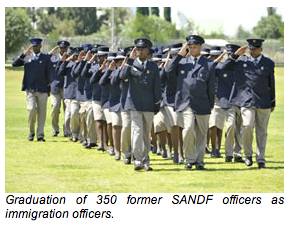
According to the Minister of Home Affairs Dr. Nkosazana Dlamini-Zuma, the training is part of the department's renewed focus on immigration, points of entry, refugees, the issuing of permits and travellers entering and leaving and the country.
According to team commander Siphiwe Maphumulo, the recruitment process for the officers was tough. Only qualified, trained officers with a service-delivery ethic and who displayed qualities such as organisational fitness, honesty, loyalty, patriotism and security awareness were chosen. Selected candidates underwent a vigorous testing process. This included psychiatric tests to ensure that they would be suitable for the job.
Better service delivery
The officers took up their posts at the OR Tambo International Airport throughout the festive period. They have already made a significant contribution towards the smooth movement of more than two million travellers in and out of the country in the period leading up to 2012.
Minister Dlamini Zuma applauded the officers for their hard work, which resulted in great strides to improve the department's service delivery levels.
-Samona Murugan
Safety & security: Taking a stand against alcohol and drug abuse
Safety & security: Taking a stand against alcohol and drug abuse sadmin
Alcohol and substance abuse contributes towards many ills such as crime, gangsterism, domestic violence and other social problems, said Minister of Social Development, Bathabile Dlamini.
We therefore believe that the magnitude of this problem requires collective national action across all spheres to deal with it. This sense of unity must be characterised by a coordinated and integrated approach that drives us towards a drug-free society.”
To achieve this, the Department of Social Development will join forces with the departments of basic education, higher education and training, trade and industry and the police to work on a five-year joint anti-alcohol and substance abuse programme of action.
Lasting solutions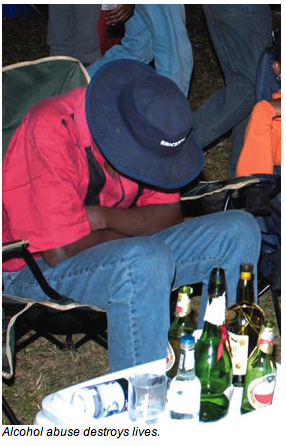
The five year programme is a result of decisions taken at the second Biennial Anti-Substance Abuse Summit held in March last year in Durban where different sectors of society discussed lasting solutions to the problem of alcohol and substance abuse.
Minister Dlamini said the Durban summit had resolved that all laws and policies relating to alcohol and substance abuse had to be brought together to address various related issues. These include effective governance of alcohol regarding production, sales, distribution, marketing, consumption and taxation.
It will comprise measures such as reducing accessibility to alcohol by raising the legal age for buying and public consumption of alcohol from 18 to 21 and restricting the times and days of the week that alcohol can be legally sold throughout South Africa, the Minister said.
The summit also resolved to increase the criminal and administrative liability of individuals and institutions such as bars, clubs, taverns, shebeens and restaurants that sell liquor to under-age drinkers.
Social grants
Minister Dlamini said government was concerned about the abuse of social grants in some communities to buy alcohol. She said during a visit to the community of Strydenburg in the Northern Cape late last year, alcohol abuse was evident in some families.
“Our visit was in the morning and the elders in that family were already drunk. It is worrying because this seemed to be a daily habit in some families; they largely depend on social grants for an income, yet there was no food in the house. The possibility is that they may use some of the income form social grants to buy alcohol. It is incidents like these which propel us to heighten the fight, especially against alcohol abuse.”
With the five-year programme of action in full swing, the Department of Social Development will focus on:
- reviewing policies and aligning liquor legislation
- education and creating awareness about substance abuse
- promoting equal access to resources throughout South Africa
- responding to policies and legislation regarding drugs and organised crime.
- Mbulelo Baloyi
Safety & security: Working together to hunt poachers
Safety & security: Working together to hunt poachers sadmin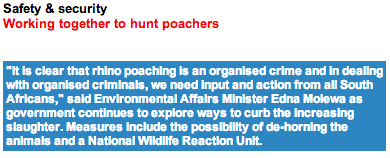
Minister Molewa strongly condemned the ongoing scourge of rhino poaching, which has seen a staggering number of 448 rhinos illegally killed in South Africa last year alone and 24 since January this year. “It is clear that we need to continue working with all stakeholders and our entire South African society, if this war on rhino poaching is to be won.”
Molewa gave the assurance that government viewed the illegal killing of this national treasure in a very serious light. “We will continue to prioritise our fight against this crime jointly with our law enforcement agencies.”
Most of South Africa’s rhino population is in the Kruger National Park, which has faced an onslaught from poachers. Government will therefore deploy an additional 150 rangers to the Kruger Park this year, to add to the current 500, to address this crime.
To de-horn or not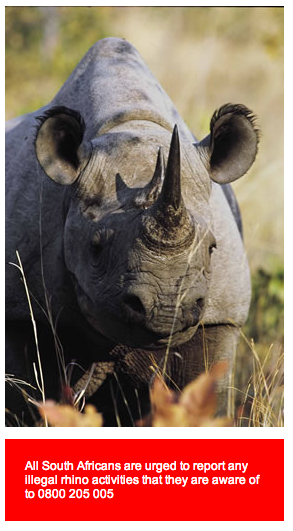
Minister Molewa said a study conducted had indicated that the decision on whether or not to de-horn a rhino population depended on a number of factors, including the level of poaching threat, the availability of funds and the size of the rhino population in question.
A continuing study commissioned by government will also look into whether legalising trade in rhino horn could help to bring down poaching.
National Reaction Unit
Other measures include the establishment of a National Wildlife Reaction Unit, which authorities are hoping will help in information sharing and curbing poaching in South Africa’s largest parks.
Molewa said the South African National Defence Force has also been returned to monitor the 350-kilometre national border in the Kruger Park.
-BuaNews
Sport & recreation: A sporting chance for schools
Sport & recreation: A sporting chance for schools sadminSport & recreation
A sporting chance for schools
As from this year, all South African schools will be expected to participate in sport. This will see the re-introduction of School Sport Wednesdays, as well as the introduction of School Sport Olympics to boost sport participation.
"School sport has a valuable contribution to make in the development and transformation of the South African society," said Minister of Sport and Recreation, Fikile Mbalula. He has found a partner for school sport development in Athletics South Africa (ASA) Chief Executive Officer Frik Vermaak.
The newly appointed ASA CEO said he welcomed Minister Mbalula's vision for sport development and sport as part of the school curriculum.
Vermaak's comments come in the wake of the signing of a Memorandum of Understanding (MOU) between the national Departments of Sport and Recreation and the Department of Basic Education.
The framework seeks to:
- Promote a well co-ordinated and seamless school sport system as a critical factor in the development of young South Africans.
- Ensure that institutional structures are in place to implement and monitor the delivery of a school sport system.
- Regulate access and delivery of school sport for all learners, irrespective of ability, across all schools based on the principle of equity and access.
- Clarify roles and responsibilities of all partners and stakeholders for both delivery and funding.
Sport Wednesdays
All schools will be expected to participate in sport and this will see the re-introduction of the School Sport Wednesdays. Minister Mbalula also committed to ensuring that the South African School Sport Olympics take place, as a culmination of participation in school sport throughout the year.
Both the Minister of Sport and Recreation and the Minister of Basic education have been championing the repositioning of school sport in South Africa, not only as a platform to discover talent, but also to advance and deepen sport brilliance and distinction. School Sport is one of the priority programmes of the Sport & Recreation Department.
Support systems
Speaking a few days after being appointed ASA CEO, the former TV sports commentator said it was important that athletics become a family again and support systems must be put in place to ensure athletes stay active in the sport, especially female athletes.
"The position of CEO of ASA will be a new challenge for me, but I am confident that I will be able to rise to those challenges and take the Federation to new heights. I am aware that there will be a lot of work to do in these beginning stages and that the next six months will be tough. My first priority now is to streamline the ASA office and make sure that everything runs smoothly," said Vermaak
Sport & recreation: Banyana get ready to shine at Olympics
Sport & recreation: Banyana get ready to shine at Olympics sadminSport & recreation
Banyana get ready to shine at Olympics
Judging from Banyana Banyana's excellent performance since the end of last year, the South African women's team is sure make us proud at the Cyprus Women's Cup from 28 February to 6 March. They are scheduled to take on some of the leading football nations.
While Banyana Banyana is preparing to shine the 2012 London Olympics in July, the Cyprus Women's Cup is the team's immediate priority. The fifth edition of the Cyprus Cup will feature defending champions Canada, Italy, 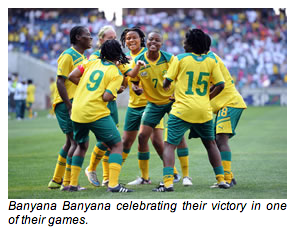 Netherlands and Scotland in Group A.
Netherlands and Scotland in Group A.
Group B features England, Finland, France and Switzerland while Group C features Korea Republic, New Zealand, Northern Ireland and South Africa.
The fourth-place teams from Groups A and B will meet the top-two teams from Group C to determine 7th/8th and 9th/10th places while the bottom-two teams from Group C will meet on 6 March to determine 11th/12th places.
Player of strength
Banyana vice-captain and striker Noko Matlou, who has scored 52 goals in her 64 appearances for the national team, said, "We have been working really hard at training and are looking forward to competing at the Cyprus Women's Cup; many of the teams that we will meet there will also be in action against us at the 2012 London Olympics in July."
Speaking in Stellenbosch where the 23 national team players underwent extensive training, Banyana coach Joseph Mkhonza stressed the importance of having players of strength.
"The top women's football nations in the world have physically strong players and we were found lacking in this department in the past hence our focus on power training during this camp.
"We have spent quite a bit of time on gym work at our training camp here at the Stellenbosch University Sport Performance Institute, where the conditioning of our players is carefully monitored by our team's physical trainer, Warren Engelbrecht," he said.
On a winning spree
Since Mkhonza took charge of Banyana shortly before Christmas last year, the Senior Women's national team has won 14 of the 18 matches they played.
They also qualified for the 2012 London Olympics, as well as reaching the semi-finals of last year's All-Africa Games.
The All-Africa Games effort was a major feat with Banyana Banyana having had to field two sides on the African continent on the same day.
On September 14 last year, Banyana Banyana played Ethiopia in the return away leg Olympic Qualifier and their semi-final All-Africa Games match against hosts, Mozambique.
This was a clear sign of the depth created in women's football in South Africa through the Sasol League that is played in all nine provinces.
-BuaNews
Sport & recreation: Mpumalanga comes alive with music and dance
Sport & recreation: Mpumalanga comes alive with music and dance sadminSport & recreation
Mpumalanga comes alive with music and dance
Mpumalanga's first annual music and dance festival was a resounding success when more than 32 groups took part in a two-day event to celebrate the province's cultural diversity.
In Africa, the rythhm and energy of life is expressed through music, song and dance and no celebration is complete without it.
In true African tradition, Mpumalanga has started an annual traditional music and dance festival to celebrate its cultural diversity. The inaugural festival took place in December at Themba Senamela Stadium in Mhluzi (Middelburg).
The province came alive with sound, movement and colour when more than 32 contemporary traditional and indigenous music and dance groups participated in the two-day festival.
Spokesperson for the provincial Department of Culture, Sport and Recreation Sibongile Nkosi said local contemporary music groups shared the stage with established traditional artists.
He said the department went to the length and breadth of Mpumalanga looking for the best performers of traditional music and dance and in the process uncovered some amazing talent.
Groups came from all corners of the province representing Swazi, Zulu, Ndebele, Pedi, Tswana, Tsonga, Indian and Afrikaner cultures.
The variety of brightly coloured traditional outfits worn by participants from the different groups complemented the vibrancy of the music.
Nkosi said the festival held under the theme: "Revival of our African norms, values and ubuntu through cultural music and dance" presented new opportunities to aspiring artists in the traditional music genre.
At the same time it afforded the people of Mpumalanga a chance to unite in experiencing the sheer joy of singing, dancing and making music together.
State of the Nation: Great expectations for 2012
State of the Nation: Great expectations for 2012 sadminState of the Nation
Great expectations for 2012
Health: On the road to recovery
South Africa’s health system is recovering following major initiatives to strengthen the system.
In June last year, the Minister of Health Dr Aaron Motsoaledi noted that the health system needed a major overhaul to prevent a crisis. The Minister outlined his plan of action, which includes four key priorities:
- to increase life expectancy
- reduce maternal and child mortality
- intensify the fight against HIV and AIDS, as well as TB, and
- to strengthen the effectiveness of the healthcare system.
The initiatives that were introduced last year serve as a foundation to build on during 2012. Achievements include:
- a meeting on non-communicable diseases and developing a programme of action to combat such diseases
- increased access to antiretroviral therapy and technology to diagnose drug-resistant TB
- consensus with key stakeholders on maternal, neonatal, infant and child mortality rates; and
- a Green Paper and national conference on the National Health Insurance (NHI).
When put into practice, the NHI will dramatically change the face of healthcare delivery in South Africa.
In a landmark achievement, 13 million people tested for HIV and eight million were screened for TB between April 2010 and June 2011.
Education: Towards quality teaching and learning for all
Strengthening learners’ literacy and numeracy ability is the key objective for 2012 and beyond, said Director-General of Basic Education, Bobby Soobrayan. For this reason, the department has developed several initiatives to ensure that every learner in South Africa can access quality education.
This year, the department will introduce its new comprehensive strategy called the Integrated National Literacy and Numeracy Strategy: A Whole School Approach. It will be used to achieve the literacy and numeracy goals set out in the department’s action plan, which will run until 2014.
The annual national assessments started in 2011 will continue in 2012 to improve literacy and numeracy. In addition, the department will expand its workbook programme. Through the Quality Learning and Teaching campaign, the department will continue to mobilise South Africans to create awareness of the President’s call that “education is a societal matter”.
Safety and Security: Building on past success for a safer South Africa
The reduction in crime last year can largely be attributed to the successes of the South African Police Service (SAPS). Along with other initiatives, such as better community, engagement and cooperation have played a significant role in stabilising crime.
Government believes that people should feel safe in their homes, in their communities and at their workplaces. The SAPS is therefore focusing on visible policing. This includes partnerships with various role players from government, business, municipalities and other interests group. Improving police response and the fair distribution of police stations remains a priority for the year ahead.
Eradication of women and child abuse is another area that will continue to receive special attention. The reintroduction of the Family Violence, Child Protection and Sexual Offences units will help significantly to achieve this goal.
Government views safety and security of rural communities as a key priority. The Rural Safety Plan, a combined effort by farmers and farm workers, rural communities and the police in various provinces, will address safety and security.
Training is also crucial in improving policing. For this reason, the department is revising its training programmes.
The White Paper for Safety and Security is also being reviewed. This will lead to the revision of the SAPS Act, transformation of the police and direction of policing.
Women, Children and People with Disabilities: Great progress towards empowerment
The Department of Women, Children and People with Disabilities has made great progress in empowering the historically neglected. This year, the department will build on initiatives started in 2011.
These include the launch of the Techno-Girl project, which encourages girls to pursue careers in science, mathematics, engineering and technology.
To ensure that issues of rural women remain on government’s agenda, the department hosted the National Rural Women Summit in Limpopo last year, as well as two provincial summits in KwaZulu-Natal and the Eastern Cape. The summits served as platforms for rural women to influence Government’s Women Empowerment Strategy.
To address children’s rights, the department has developed a framework to guide departments and civil society organisations to make children’s rights issues part of their governance processes.
At the end of last year, the department launched the Universal Accessibility Campaign. Until March 2014, the campaign will be focusing on reasonable accommodation in the workplace, access to government buildings, public transport and social security.
To address gender violence, the department is planning to establish a national council against gender-based violence in the first quarter of 2012. The council will review and monitor the implementation of the existing 365 Days National Action Plan for No Violence Against Women and Children.
-Samona Murugan
Support for ill breadwinners in Mpumalanga
Support for ill breadwinners in Mpumalanga sadmin
The department spends 37 per cent of its annual budget funding projects aimed at minimising poverty among disadvantaged communities in the province.
“We have people on the ground who are helping us locate such families and investigate the situation. If our investigation reveals that the family qualify to get assistance, we intervene,” department spokesperson Ronnie Masilela said in an interview on Tuesday.
Masilela was responding to an enquiry which resulted in the department helping the family of Stanley Selale, 32, from Bushbuckridge, Mpumalanga. Selale lost his job when he developed elephantiasis in 2009.
The disease caused his right leg to more than double in size, forcing him to stay at home without any source of income.
Social grant
Masilela said the department gave Selale a voucher to buy groceries for three months while the department finalised his social grant.
“We sent a social worker [there] and our investigation confirmed that Selale is suffering from the disease. He will use the voucher to buy food for himself and his family while we are still preparing for his disability grant,” said Masilela.
He said families in similar situations were assisted through community-based projects, including home-based care centres and others. Selale said he could not believe his eyes when a social worker arrived at his home.
“I am very excited that government is helping me in these trying times. I really appreciate the help that they offered me and I believe that they will continue supporting me until I get better,” said Selale.
He said his life turned for the worst when he lost his job because of his condition.
A few days after the doctor told me about the disease I got so sick that I could not even walk. I lost my job and lots of things in my life because of this disease. When the leg is painful my stomach and my head also hurt,” he said.
Come forward
Elephantiasis is caused by parasitic worms. The disease is characterised by a thickening of the skin and underlying tissues. In men, the legs and genitals tend to be affected.
Masilela urged families and community members to come forward if they are in these types of situations.
“We are also urging everyone who sees their neighbour living in poverty because of a similar situation to telephone us. We do advertise in the media about the help that people can get from our department, but a lot of people do not get the message,” said Masilela.
-Masoka Dube
The people's priorities for the new year
The people's priorities for the new year sadminThe people's priorities for the new year
Stef Venter, Centurion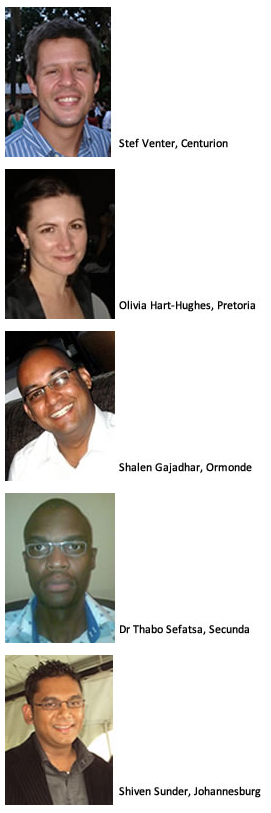
Crime and corruption is still a major problem in South Africa. My wish for 2012 is that more measures will be taken to reduce it. I believe people such as the police and state prosecutors responsible for the administration of justice and combating crime, should get better salaries. This will motivate them to carry out their duties without the need for bribery and corruption. There should be absolutely no tolerance for corruption in the police service, as they are the people we are supposed to look up to for protection.
Olivia Hart-Hughes, Pretoria
The stampede for registration at the University of Johannesburg in January was shocking. My hope for 2012 is that this has been a wake-up call for government to give urgent attention to improve accessibility to tertiary education and prevent this from happening again. The youth are our future and nothing should stand in their way to further their education. I would also like to see more job opportunities and that people will be appointed in jobs based on competence instead of their race.
Shalen Gajadhar, Ormonde
My hope for 2012 is that Government will begin to tackle the widening gap in wealth distribution. This needs to be done through access to education, a tertiary education institution, which offers back skills on a study-now, pay-later model and tougher regulations in private industries to up-skill employees. With inflation, rates, taxes and tolls constantly raised, people are becoming poorer. I hope that the ANC once again highlights education and service delivery as paramount to a steady growth path.
Dr Thabo Sefatsa, Secunda
I believe we can change a lot in the public healthcare sector by just changing our attitude. The majority of the problems within the health sector result from wrong attitudes – from security personnel to doctors and nurses. We must remember it is our government, our problems and our solutions.
Shiven Sunder, Jhb
I hope that in the new year, more money will be allocated to education, so that we can maintain, upgrade and build more schools, especially in rural areas. I would also like to know what government is planning to do to curb crime.
Lee Smith, Pretoria
Hahaha, whatever the expectations, they will never be able to fulfil them. There simply isn’t enough money in the country. Too few people earn enough to pay sufficient tax and the people in Government splash out. It never goes back to the people, where it is needed. I’m in Turkey now and things are exactly the same here. Corruption everywhere!
Trevor Khanyile
My expectations for 2012 are the professionalisation and skilling of municipal officials to be able to deliver the services government promised to the people. There is gross inefficiency at municipalities, which hinders delivery of services leading to people saying that government is not doing anything for them. If officials have the correct skills they will be able to find creative ways of creating jobs at local municipality level. There needs to be a close link between national and local government to avoid this thing of municipalities being placed under administration after officials have squandered the money. Mud schools should not be something that still characterises South Africa. Indeed people in the rural areas will continue to say that government have not done anything for them if they still do not have electricity and clean water. All these are issues of capacity nothing else. Government needs to really skill and re-skill officials at local government levels or else nothing will ever change.
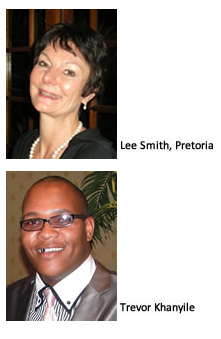
Youth matters: Gauteng helps child-headed households
Youth matters: Gauteng helps child-headed households sadmin

When her mother passed away in 2008, Nthabiseng became one of many young people in Gauteng who are forced to look after their siblings at a tender age while struggling to make ends meet. Through the help of the GautengDepartment of Local Government and Housing and the private sector, living conditions for Nthabiseng and her family have improved considerably.
As part of the 16 Days of Activism of No Violence Against Women and Children Campaign last November, the Gauteng government joined hands with the private sector to change the lives of 16 child-headed families in the province. Some received new houses, while existing houses including Nthabiseng's house, received major renovations or were extended.
A better future
MEC Humphrey Mmemezi visited three of the 16 families who benefited from the project. He said he was pleased that government departments had joined hands with the private sector to assist these families.
Urging the young orphans to look after each other and take their schoolwork seriously, Mmemezi said the new houses should be a start for them to prepare for a better future. "I hope the new homes will be used by all of you to break the shackles of poverty and become something good in life.
"We all need assistance to stand up, but there is a time in life when you will have to stand on your own. This can only be achieved through determination and dedication to your school work."
Donation of furniture
Mmemezi also visited the child-headed family of 18-year-old Olinda Mentor in Kagiso. Olinda, who is in Grade 12, looks after her nine-year-old younger sister who is in Grade 4. Their house was renovated, and they received a donation of much-needed furniture. Olinda thanked the MEC saying that this would make life much easier for them.
Another beneficiary, Phuthi Morena (21) of Diepsloot in Johannesburg, was also forced to leave school to take care of her siblings. After their father was killed in 2007 and their mother died in 2008, she had to take over the household. When their house was extensively improved and enlarged to provide the family with much better living conditions, Phuthi was overjoyed, saying it was like a dream come true.
Youth matters: Girls go techno
Youth matters: Girls go techno sadmin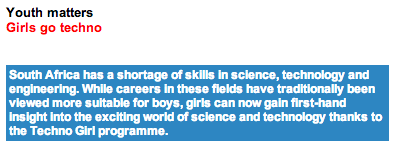
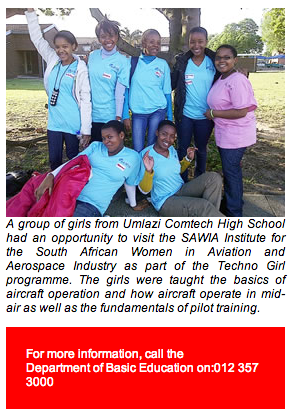
Techno Girl is an initiative piloted by the Department of Basic Education, in partnership with the United Nations Children's Fund and Uweso Consulting. It aims to help young girls from disadvantaged backgrounds to pursue scarce careers most urgently required in South Africa. The programme focuses exclusively on careers in the fields of science, technology, engineering and mathematics.
The Techno Girl programme identifies young women in underprivileged schools and involve them in corporate mentorship and skills development initiatives. The career mentorships help them gain confidence and link their school lessons to the skills they'll need to succeed in the working world.
"Approximately 4 000 disadvantaged girls from public schools are placed in a structured job-shadowing programme for three consecutive holidays annually over a period of four years," said Uweso Consulting's CEO, Staff Sithole.
Career guidance
The Techno Girl programme was first launched in 2009 by the Gauteng Department of Education and was extended to the other provinces in 2010 and 2011. Girls start with the programme when they enter Grade 9 and exit on completion of Grade 12.
A Grade 11 learner at Cosmo City Secondary School, Tshegofatso Mokoena, said the programme had boosted her self-esteem. "This programme made me realise how the corporate world works and now I am ready to face it," she said. "It also gives us career guidance and motivational discussions."
Selection criteria
To ensure that the right learners are selected to participate in the programme, the following selection criteria apply:
- all beneficiaries should be girls from disadvantaged communities
only girls in Grades 9, 10, 11 and 12 are eligible for selection - applicants must be from public schools
- applicants must obtain at least 50 per cent (level 4), in maths/maths literacy
- applicants must have a good behavioural and disciplinary record
- applicants must be dedicated learners who have a keen interest in their academic performance.
Youth matters: New year, new home
Youth matters: New year, new home sadminYouth matters
New year, new home
Duduza residents can start the New Year afresh with new homes made possible by the Gauteng Department of Local Government and Housing and the private sector.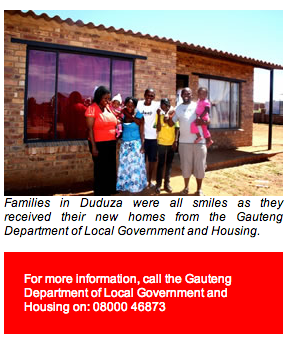
The community of Duduza suffered great losses when a tornado struck Ekurhuleni in October last year, leaving more than 160 people injured and/or homeless. Tragically, an eight-year-old child died in the incident.
Dignity
The homes were rebuilt after the Ekurhuleni municipality joined forces with more than 1 000 volunteers from the National Youth Development Agency under the supervision of private contractors.
Mongezi Ndwandwa, senior project manager at Mellon Housing, one of the sponsors, said the main aim of their involvement was to restore the dignity of the residents by rebuilding their homes.
After months of hard work, Gauteng Local Government and Housing MEC, Humphrey Mmemezi handed over some of the new homes the community. He said the rest of the houses would be completed within the following weeks.
"We are hoping to eventually hand over more than 50 houses. This partnership between the department and contractors has demonstrated that by working together, we can really do more."
Overjoyed
Evelyn Lamon, a 53-year-old mother of four children was one of the beneficiaries. She was overjoyed when Mmemezi presented her with the keys to a new house. After the tornado struck she was forced to share a one-room makeshift shack with her children.
"The beauty of this new house is that it is divided into rooms. The previous RDP house was an open plan and we had to use curtains to make partitions. Now I can have my privacy and my children will have their own room," said an excited Lamon.